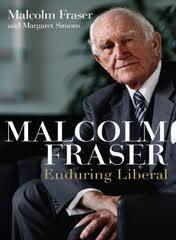MALCOLM
FRASER - PC AC CH GCL
Born May 21 1930
- Former Australian Prime Minister -
G'day guys, today I welcome Australia's 22nd Prime Minister - Malcolm Fraser. Who was he? Malcolm John Fraser was embroiled in extraordinary controversy in this country - especially on the 11th of November 1975. However, he has become an outspoken activist on many global issues since he retired from politics. That is what I most admire about this man. Here is a brief timeline:
Brief Biography Of Malcolm Fraser
- 1930
Born May 21. As a boy, he lived at Nareen in the Western District. Attended Melbourne Grammar and Magdalen College, Oxford. Studied Philosophy, Politics and Economics. - 1954
Defeated in election for Wannon, but reduced the ALP member’s majority from 5000 to 17. - 1955
Won Wannon. The seat has been held by the Liberal Party ever since. - 1966
Appointed Minister for the Army by Harold Holt. - 1968
Appointed Minister for Education and Science by John Gorton. - March 1971
Resigned from Gorton’s Cabinet, accusing Gorton of disloyalty and a “manic determination to get his own way”. Gorton then faced a leadership challenge, losing to William McMahon. Fraser contested the Deputy’s position, but was defeated by Gorton. - December 1972
Following the defeat of the McMahon government by Whitlam’s ALP, Fraser contested the leadership and deputy leadership of the Liberal Party, but was defeated for both positions. - November 1974
Following the coalition’s defeat at the May 1974 elections, Fraser challenged Bill Snedden for the leadership. He was defeated. - March 1975
Fraser defeats Snedden following another challenge. - November 11, 1975
Fraser appointed Prime Minister by Sir John Kerr, following the dismissal of Gough Whitlam. - December 13, 1975
Coalition parties win a landslide victory in the double dissolution election. - December 10, 1977
Fraser wins second term, securing a majority almost as large as the one in 1975. - October 18, 1980
Fraser wins a third term, but with a reduced majority. - 1982
Andrew Peacock resigns from Fraser’s Cabinet, accusing him of a “manic determination to get his own way”. A leadership challenge ensues and Fraser defeats Peacock by 54 votes to 27. - March 5, 1983
Having called an early double dissolution election, Fraser is defeated by the ALP, now led by Bob Hawke. Fraser immediately resigns from Parliament.
11th of November 1975
He began his term as caretaker Prime Minister on 11 November 1975, after
Governor-General Sir John Kerr dismissed Gough Whitlam’s Labor
government. The Fraser Coalition government was returned with the
largest landslide of any federal election a month later, and remained in
office until 1983. Nonetheless, the constitutional crisis made its
beginning controversial and marked Fraser’s prime ministership.
Malcolm Fraser emerges from Parliament House on 11 November 1975, after announcing that
Governor-General Sir John Kerr had appointed him caretaker Prime
Minister.
Before becoming Prime Minister, Malcolm Fraser had spent ten years as a backbencher in the government of Robert Menzies. He became Minister for the Army in 1966, under Harold Holt, and was also a minister in the governments of John Gorton and William McMahon.
Achievements:
-
1976:
Establishment of the Family Court of Australia and Federal Court of Australia;
Northern Territory granted self-government;
Passage of Aboriginal Land Rights (Northern Territory) Act;
Position of Federal Ombudsman established;
ABC FM radio service established.
-
1977:
National Aboriginal Conference established;
SBS (Special Broadcasting Service) established to provide multilingual radio and television services.
-
1978:
Approval for building new, permanent Parliament House on Capital Hill, Canberra.
-
1979:
Norfolk Island Legislative Assembly established;
Fraser played key role in ending racial war in the former UK colony of Rhodesia, enabling elections to be held and a new nation - Zimbabwe - to be established under black rule;
- The government established the Australian Refugee Advisory Council to advise it on the settlement of refugees, many of whom had been arriving as 'boat people' from Vietnam since 1978.
-
1980:
Aboriginal Development Commission established;
In protest against the Soviet invasion of Afghanistan, the government cut wheat sales to the Soviet Union and discouraged Australian participation in the Moscow Olympics;
- First commercial FM radio broadcasting stations and first ethnic television stations established under SBS (Channel 0 Sydney and 28 Melbourne).
-
1981:
The government declared a 36,000 square km of the Cairns section of the Great Barrier Reef as a marine park.
-
1982:
Appeals to the Privy Council were abolished, making the High Court the final court of appeal;
- A new migrant selection scheme was introduced, based on criteria relating to family reunion and the need for skilled workers.
- Clancy's comments: Malcolm Fraser is perhaps most remembered for his role in the political upheaval of 1975, a series of events which commentators continue to scrutinize. More recently, Fraser was co-chairman of the Commonwealth Group of Eminent Persons, which worked toward democracy in South Africa. He formed the humanitarian aid organization CARE Australia in 1987, which he chaired until 2002, and served as president and vice-president of CARE International. It would seem that politicians come to their senses and think realistically when they leave the political arena. What a shame we can't find one to think and act like that whilst they are in office ...
-






No comments:
Post a Comment